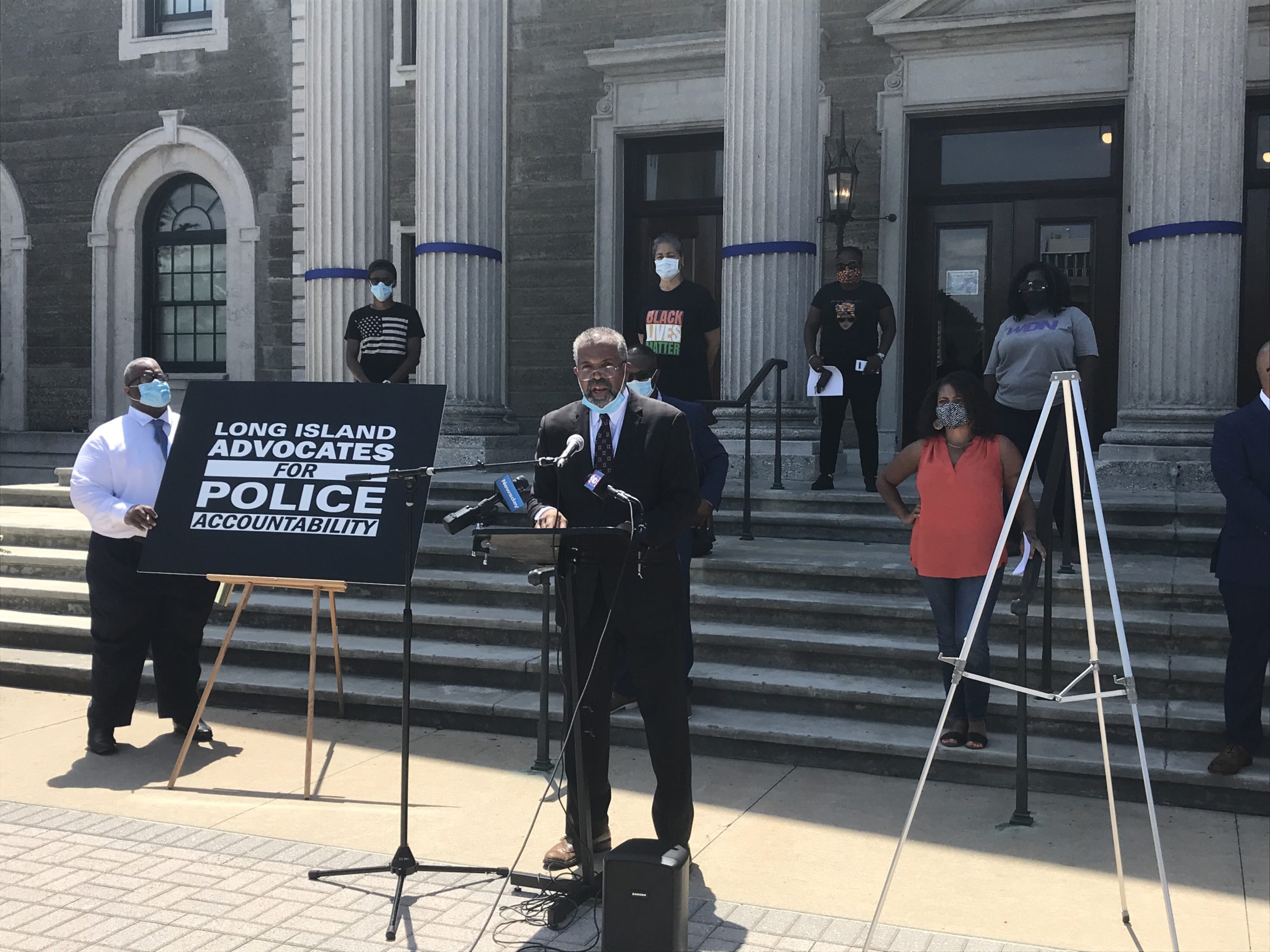The newly formed Long Island Advocates for Police Accountability stood on the steps of the Theodore Roosevelt Executive and Legislative Building Thursday afternoon to announce the introduction of legislation that will establish a Civilian Complaint Review Board within the county to serve as a check on police power abuse.
The LIAPA, which count civil rights attorney Fred Brewington and ex-NYPD cop Dennis Jones as members, was formed several weeks ago amid protests and calls for police reform nationwide, after the recent death of George Floyd in Minneapolis and other publicized cases of police brutality against Black citizens in recent years.
“Coming out of the background of the people that stood up and dared to say the words Black Lives Matter, we are here to echo the fact that change must come,” Brewington said Thursday to a crowd of onlookers.
An executive order signed by Gov. Andrew Cuomo on June 12th mandated that local governments that have a police force operating within them must “perform a comprehensive review of current police force deployments, strategies, policies, procedures and practices and develop a plan to improve” those.
The proposed review board would have the power to investigate complaints from members of the public against Nassau County police for everything from offenses as serious as excessive use of force to things such as discourtesy and harassment.
The board will submit a report of the investigation to the county police commissioner and may recommend “penalties, discipline, a psychological evaluation, instructions with formalized training” or some combination thereof, according to the legislature.
New York City has had a similar review board in place since the 1990s and Jones said it is overdue in Nassau County.
The board will consist of 11 members of the public. Each member must be a resident of Nassau County.
Five members will be appointed by the county legislature, five will be appointed by the county executive and the board’s chair will be jointly appointed by the county executive and the presiding officer of the legislature.
The proposed legislature includes a clause that prevents any member of the board from having a conflict of interest. This includes anyone who has had any experience in law enforcement in any capacity.
However, those with experience as attorneys will be permitted. Brewington said other potential conflicts would be if someone has a relative in law enforcement or someone who has a “pending action” against police.
Brewington, Jones and Rahsmia Zatar, another member of LIAPA, said that police are asked to do too much, that they are a catch-all expected to respond to too wide a range of situations for the amount of expertise they have.
“I want to elevate, today, the absurdity of our current policing system,” Zatar said. “That does not acknowledge the humanity of our police officers. This is not an anti-police issue, we are not anti-police, we are anti- the absurdity of the current structure.”
The LIAPA argued that police are not given support in terms of mental health and are suffering because of it and are not given training to deal with certain situations that they are expected to respond to.
“911 was an easy way out for our communities and our municipalities,” Jones said. “Let the police handle that. A cat up in the tree: call the police, a guy robbing the bank: call the police. That’s too ridiculous.”
Jones said police feel the stress of having to deal with such a wide array of problems, but because they have never known any other system, they haven’t seriously questioned it until now.
Jones got out of the police academy when he was 22 and said that often times he would not be able to get to a call that warranted a police response because he would be dealing with a call such as two people arguing, something that other types of professionals could deal with.
“A police 911 call should be for emergencies,” Jones said. “A family dispute shouldn’t be deemed an emergency. Nine times out of ten it’s an argument and the officer has to go in there and become a peacemaker. He doesn’t even know how to do that.”
Jones said mental health and social work professionals could work within police departments but if that system does not work, the resources should be reallocated. He said the LIAPA is working currently to define “defunding.” To him, it means reallocating funds from police to other sectors of the community, and therefore certain issues won’t fall on police anymore.
Jones points toward the fact that some police departments have military-style equipment and vehicles.
The militarization of local police departments has been a controversial issue in recent years.
An article posted on the ACLU’s website in 2013 showed that Keene, N.H. a low-crime town with a modest population, local police were given a grant by the Department of Homeland Security to purchase a BearCat, an armored vehicle that can be mounted with high-caliber weapons. This is one of several documented examples of small-town police being given military power.
“What could we have done with the money they spent on those items?” Jones asked. “Nobody knows.”



